|
|
|
Sort Order |
|
|
|
Items / Page
|
|
|
|
|
|
|
| Srl | Item |
| 1 |
ID:
154149
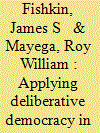

|
|
|
|
|
| Summary/Abstract |
Practical experiments with deliberative democracy, instituted with random samples of the public, have had success in many countries. But this approach has never before been tried in Sub-Saharan Africa. Reflecting on the first two applications in Uganda, we apply the same criteria for success commonly used for such projects in the most advanced countries. Can this approach work successfully with samples of a public low in literacy and education? Can it work on some of the critical policy choices faced by the public in rural Uganda? This essay reflects on quantitative and qualitative results from Uganda's first Deliberative Polls. We find that the projects were representative in both attitudes and demographics. They produced substantial opinion change supported by identifiable reasons. They avoided distortions from inequality and polarization. They produced actionable results that can be expected to influence policy on difficult choices.
|
|
|
|
|
|
|
|
|
|
|
|
|
|
|
|
| 2 |
ID:
154150


|
|
|
|
|
| Summary/Abstract |
Authoritarian rule in China increasingly involves a wide variety of deliberative practices. These practices combine authoritarian command with deliberative influence, producing the apparent anomaly of authoritarian deliberation. Although deliberation and democracy are usually found together, they are distinct phenomena. Democracy involves the inclusion of individuals in matters that affect them through distributions of empowerments like votes and rights. Deliberation is the kind of communication that involves persuasion-based influence. Combinations of command-based power and deliberative influence – like authoritarian deliberation – are now pervading Chinese politics, likely a consequence of the failures of command authoritarianism under the conditions of complexity and pluralism produced by market-oriented development. The concept of authoritarian deliberation frames two possible trajectories of political development in China. One possibility is that the increasing use of deliberative practices stabilizes and strengthens authoritarian rule. An alternative possibility is that deliberative practices serve as a leading edge of democratization.
|
|
|
|
|
|
|
|
|
|
|
|
|
|
|
|
| 3 |
ID:
154145


|
|
|
|
|
| Summary/Abstract |
This essay focuses on recent proposals to confer decisional status upon deliberative mini-publics such as citizens' juries, Deliberative Polls, and citizens' assemblies. Against such proposals, I argue that inserting deliberative mini-publics into political decision-making processes would diminish the democratic legitimacy of the political system as a whole. This negative conclusion invites a question: which political uses of mini-publics would yield genuinely democratic improvements? Drawing from a participatory conception of deliberative democracy, I propose several uses of mini-publics that could enhance the democratic legitimacy of political decision-making in current societies.
|
|
|
|
|
|
|
|
|
|
|
|
|
|
|
|
| 4 |
ID:
154144


|
|
|
|
|
| Summary/Abstract |
Recent calls to inject substantial doses of deliberation into democratic politics rest on a misdiagnosis of its infirmities. Far from improving political outcomes, deliberation undermines competition over proposed political programs–the lifeblood of healthy democratic politics. Moreover, institutions that are intended to encourage deliberation are all too easily hijacked by people with intense preferences and abundant resources, who can deploy their leverage in deliberative settings to bargain for the outcomes they prefer. Arguments in support of deliberation are, at best, diversions from more serious threats to democracy, notably money's toxic role in politics. A better focus would be on restoring meaningful competition between representatives of two strong political parties over the policies that, if elected, they will implement. I sketch the main outlines of this kind of political competition, differentiating it from less healthy forms of multiparty and intraparty competition that undermine the accountability of governments.
|
|
|
|
|
|
|
|
|
|
|
|
|
|
|
|
| 5 |
ID:
154147
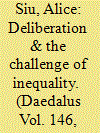

|
|
|
|
|
| Summary/Abstract |
Deliberative critics contend that because societal inequalities cannot be bracketed in deliberative settings, the deliberative process inevitably perpetuates these inequalities. As a result, they argue, deliberation does not serve its theorized purposes, but rather produces distorted dialogue determined by inequalities, not merits. Advocates of deliberation must confront these criticisms: do less-privileged, less-educated, or perhaps illiterate participants stand a chance in discussions with the more privileged, better educated, and well spoken? Could their arguments ever be perceived or weighed equally? This essay presents empirical evidence to demonstrate that, in deliberations that are structured to provide a more level playing field, inequalities in skill and status do not translate into inequalities of influence.
|
|
|
|
|
|
|
|
|
|
|
|
|
|
|
|
| 6 |
ID:
154146


|
|
|
|
|
| Summary/Abstract |
Are citizens or politicians (more) capable of deliberation, and when should they be willing to do so? In this essay, we first show that both politicians and citizens have the capacity to deliberate when institutions are appropriate. Yet high-quality deliberation sometimes collides with democratic principles and ideals. Therefore, we employ a “need-oriented” perspective, asking when and where citizens and the political workings of democracy need high-quality deliberation and when and where this is less the case. On this account, we propose a number of institutional interventions and reforms that may help boost deliberation in ways that both exploit its unique epistemic and ethical potential while simultaneously making it compatible with democratic principles and ideals.
|
|
|
|
|
|
|
|
|
|
|
|
|
|
|
|
| 7 |
ID:
154142
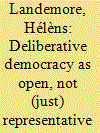

|
|
|
|
|
| Summary/Abstract |
Deliberative democracy is at risk of becoming collateral damage of the current crisis of representative democracy. If deliberative democracy is necessarily representative and if representation betrays the true meaning of democracy as rule of, by, and for the people, then how can deliberative democracy retain any validity as a theory of political legitimacy? Any tight connection between deliberative democracy and representative democracy thus risks making deliberative democracy obsolete: a dated paradigm fit for a precrisis order, but maladjusted to the world of Occupy, the Pirate Party, the Zapatistas, and other antirepresentative movements. This essay argues that the problem comes from a particular and historically situated understanding of representative democracy as rule by elected elites. I argue that in order to retain its normative appeal and political relevance, deliberative democracy should dissociate itself from representative democracy thus understood and reinvent itself as the core of a more truly democratic paradigm, which I call “open democracy.” In open democracy, popular rule means the mediated but real exercise of power by ordinary citizens. This new paradigm privileges nonelectoral forms of representation and in it, power is meant to remain constantly inclusive of and accessible–in other words open–to ordinary citizens.
|
|
|
|
|
|
|
|
|
|
|
|
|
|
|
|
| 8 |
ID:
154148


|
|
|
|
|
| Summary/Abstract |
In the last decades, many political theorists have explored the idea of deliberative democracy. The basic claim is that well-functioning democracies combine accountability with a commitment to reflection, information acquisition, multiple perspectives, and reason-giving. Does that claim illuminate actual practices? Much of the time, the executive branch of the United States has combined both democracy and deliberation, not least because it has placed a high premium on reason-giving and the acquisition of necessary information. It has also contained a high degree of internal diversity, encouraging debate and disagreement, not least through the public comment process. These claims are illustrated with concrete, if somewhat stylized, discussions of how the executive branch often operates.
|
|
|
|
|
|
|
|
|
|
|
|
|
|
|
|
| 9 |
ID:
154143
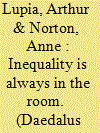

|
|
|
|
|
| Summary/Abstract |
Deliberative democracy has the potential to legitimize collective decisions. Deliberation's legitimating potential, however, depends on whether those who deliberate truly enter as equals, whether they are able to express on equal terms their visions of the common good, and whether the forms and practices that govern deliberative assemblies advance or undermine their goals. Here, we examine these sources of deliberation's legitimating potential. We contend that even in situations of apparent procedural equality, deliberation's legitimating potential is limited by its potential to increase normatively focal power asymmetries. We conclude by describing how deliberative contexts can be modified to reduce certain types of power asymmetries, such as those often associated with gender, race, or class. In so doing, we hope to help readers consider a broader range of factors that influence the outcomes of attempts to restructure power relationships through communicative forums.
|
|
|
|
|
|
|
|
|
|
|
|
|
|
|
|
| 10 |
ID:
154141


|
|
|
|
|
| Summary/Abstract |
Retrieving an insight dating back to antiquity, this essay argues that the confrontation of opposing views and arguments is desirable in political deliberation. But freedom of speech and diversity among deliberators do not suffice to secure that outcome. Therefore we should actively facilitate and encourage the presentation of contrary opinions during deliberation. Such confrontation is our best means of improving the quality of collective decisions. It also counteracts the pernicious fragmentation of the public sphere. It facilitates the comprehension of choices. Lastly, arguing for and against a given decision treats the minority with respect. This essay proposes practical ways of promoting adversarial deliberation, in particular the organization of debates disconnected from electoral competition.
|
|
|
|
|
|
|
|
|
|
|
|
|
|
|
|
| 11 |
ID:
154139
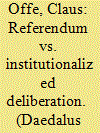

|
|
|
|
|
| Summary/Abstract |
This essay proceeds in three steps. First, it will briefly outline the often invoked “crisis” of representative democracy and its major symptoms. Second, it will discuss a popular yet, as I shall argue, worryingly misguided response to that crisis: namely, the switch to plebiscitarian methods of “direct” democracy, as advocated, for example, by rightist populist forces in many European Union member states. The United Kingdom's Brexit referendum of June 2016 illuminates the weaknesses of this approach. Third, it will suggest a rough design for enriching representative electoral democracy with nonelectoral (but “aleatory,” or randomized) and nonmajoritarian (but deliberative and consultative) bodies and their peculiar methods of political will formation (as opposed to the expression of a popular will already formed).
|
|
|
|
|
|
|
|
|
|
|
|
|
|
|
|
| 12 |
ID:
154140


|
|
|
|
|
| Summary/Abstract |
This essay reflects on the development of the field of deliberative democracy by discussing twelve key findings that capture a number of resolved issues in normative theory, conceptual clarification, and associated empirical results. We argue that these findings deserve to be more widely recognized and viewed as a foundation for future practice and research. We draw on our own research and that of others in the field.
|
|
|
|
|
|
|
|
|
|
|
|
|
|
|
|
|
|
|
|
|